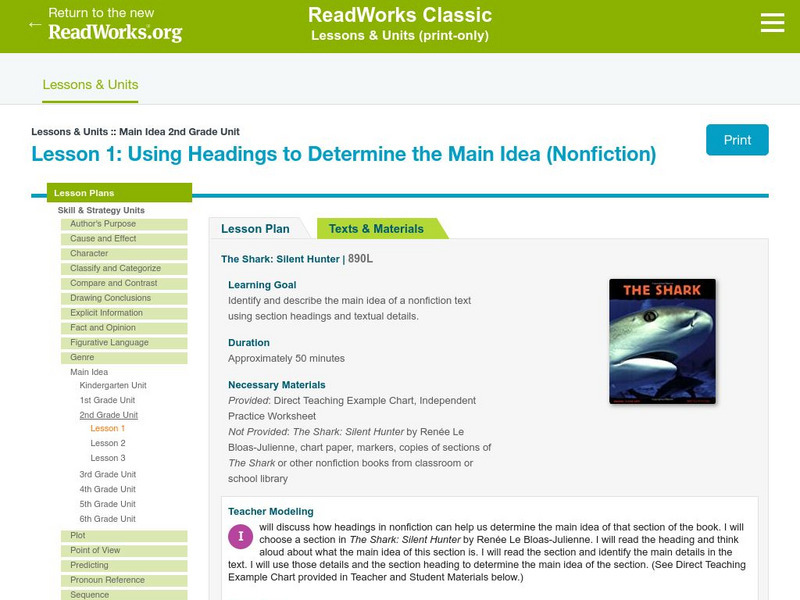Hi, what do you want to do?
Curated OER
Oceans
First graders examine how the earth is covered with more water than land. They toss an inflatable globe around the classroom, and each time a student catches the ball with two fingers, they tally whether the fingers land on water or...
Curated OER
Learning About Our World
Students explore their world using the book "This is the Way We Go to School." They predict information about the story based on the title and pictures. Students label a world map with the names of continents and oceans. They write a set...
Curated OER
What do You do if You See a Fire?
Pupils discuss what they would do if they saw a neighbor's house on fire and what information they would need to know to tell the 911 operator. They watch as the teacher models how to call 911 and observe that the numbers are called only...
Curated OER
Reduce and Respect!
Students examine how to reduce trash to help the environment. In this environment lesson, students listen to the story, The Wartville Wizard, before thinking about how they can reduce trash. They decide why it is important to reduce...
Curated OER
Washington/Lincoln Compare and Contrast
Students examine the lives of George Washington and Abraham Lincoln. Using the information, they complete a Venn diagram discovering what the two men had in common. In groups, they review a timeline made in an earlier lesson and view a...
Curated OER
The Berenstain Bears Don't Pollute (Anymore)
Students listen to the story, The Berenstain Bears Don't Pollute (Anymore). They create a Venn Diagram comparing it with the story, The Lorax. Then students plan ways to become advocates for recycling.
Curated OER
1-Use, 2-Use, Re-Use, New Use
Students list the possible uses of grocery bags. They trace the steps of a grocery bag either to recycle or trash. In groups, students use the grocery bags to create posters promoting reuse.
Curated OER
Reflection with a Friend
Pupils listen to story and respond with illustrations and comments.
Curated OER
Synonyms and Antonyms
Students explore and respond to poetry. They define and identify synonyms and anotnyns. They create antonym pairs in English. They create synonym pairs in English and Spanish.
Curated OER
Rain and Our Environment
First graders understand the importance of rain in our environment by writing a sentence about something in existence that would cease to be without rain. They use describing words to describe the living thing's color and draw and color...
Curated OER
Number Families
First graders examine the relationship between numbers and number families. They listen to the poem "Kangaroo and Toad" by Shel Silverstein and create a list of the largest animals they can think of. Students then order the animals...
Curated OER
Write Simple Rhymes
First graders observe that rhyming words have different beginnings, but the same endings by viewing examples on the overhead projector. They say the beginnings of the words that go with the correct endings. They then come up one at a...
Hopelink
Hopelink: Reading Lesson Idea: Qar a Reading Comprehension Strategy
Brush up on your reading comprehension skills when you check out this website. It looks at a particular strategy called QAR. QAR stands for "Question-Answer Relationships." This particular strategy helps students learn to answer reading...
Reading Rockets
Reading Rockets: "Seven Strategies to Teach Text Comprehension" by c.r. Adler
In this article, "comprehension strategies" are explained. Supported by research, these strategies are divided into seven different steps, including the following: monitoring comprehension, metacognition, graphic and semantic organizers,...
Reading Rockets
Reading Rockets: Using Collaborative Strategic Reading
In this article, the Collaborative Strategic Reading (CSR) technique is explained, along with research to support the use. The technique teaches students to use comprehension strategies, while working cooperatively, as they engage in the...
Reading Rockets
Reading Rockets: 103 Things to Do Before/during/after Reading
The highly-respected Reading Rockets program offers both teachers and students a toolkit of ways to connect more actively with the materials they read. Some of these techniques are specifically for fiction-reading, others are designed...
Reading Rockets
Reading Rockets: Teaching Reading: Classroom Strategies
A collection of effective, research-based classroom strategies to help build and strengthen literacy skills in print awareness, phonological awareness, phonics, fluency, vocabulary, comprehension, and writing.
Free Reading
Free Reading: Amplify Education, Inc.: Introduce Reading Connected Text
An exciting introduction to reading! The instructor writes a simple, one-line story on the board from literature, and the students learn to sound out the words.
Other
Thinkport.org: Monitor Comprehension
A resourceful site explaining, chronicling, and detailing the idea of students' monitoring their own comprehension of a task or understanding. Includes a video link, quotes from experts, links, and more.
International Reading Association
Reading Online Articles: Comprehension Instruction
An article on improving reading comprehension through time-tested strategies as well as a summary of new hypotheses about effective comprehension instruction.
Michigan State University
Michigan State University: Intervention for Reading: Summarization Strategy
Improve understanding of expository materials by summarizing the main ideas. The summarization strategy helps students recall the main ideas and specific facts of materials they read. There are five rules for writing summaries.
TES Global
Blendspace: Reading Comprehension Visualizing
A five-part learning module with links to images and web sites to help student improve reading comprehension by visualizing.
ReadWriteThink
Read Write Think: Let's Read It Again: Comprehension Strategies for Ell's
Help Spanish-speaking English-language learners unlock the mysteries of their new language by using a bilingual book to recognize unfamiliar words and construct meaning from the text.
Read Works
Read Works: Using Headings to Determine the Main Idea: The Shark: Silent Hunter
[Free Registration/Login Required] Reading comprehension strategies are the focus of this ReadWorks lesson. Students will pay attention to headings, subheadings, and other text features to help them comprehend nonfiction text. Renee Le's...
Other popular searches
- Active Listening Strategies
- Comprehension Strategies 1st
- Listening Skill Strategies
- Listening Strategies
- Comprehension and Strategies




























